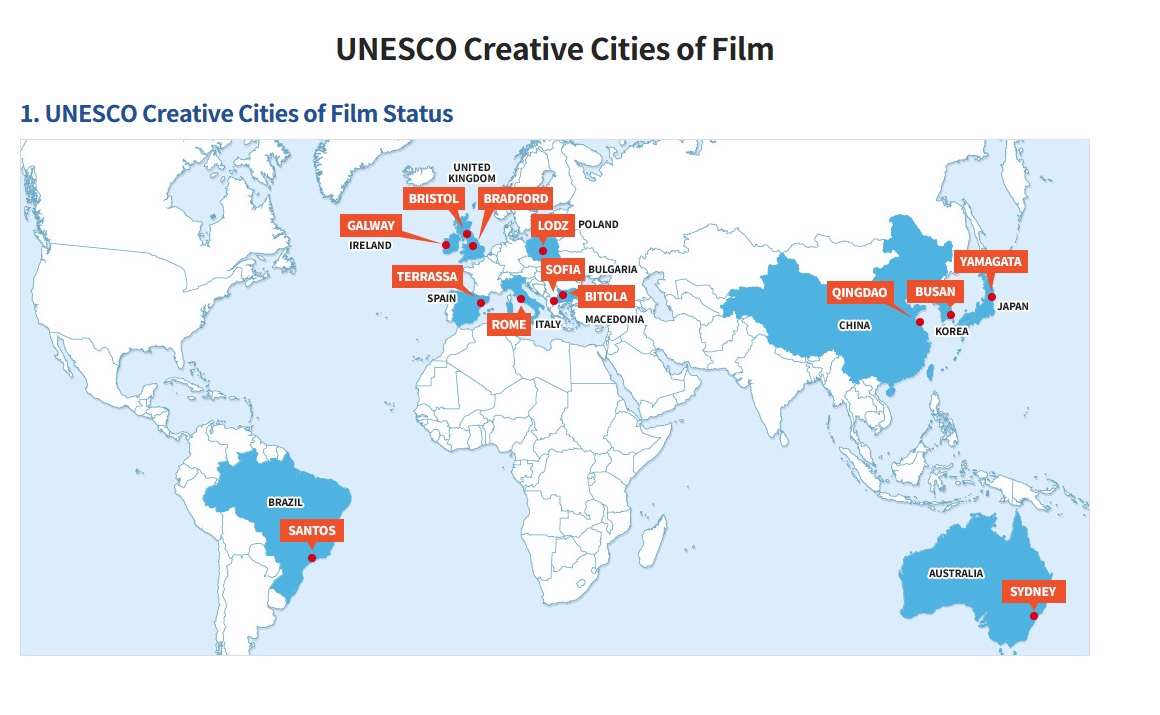What is a UNESCO City of Film?
In 2015, Bitola was awarded the prestigious title of UNESCO City of Film. Bitola joined Bradford(UK), Sydney(Australia), Galway(Ireland), Busan (South Korea) and Sofia (Bulgaria) together with Santos(Brazil) and Rome(Italy). This is a permanent global designation and brings the highest internationally recognized standard of excellence in the creative industries to Bitola. After 5 cities designation in 2017 Qingdao(China), Bristol(UK), Yamagata(Japan), Terrassa (Spain), Lodz(Poland), 13 Cities in total have become the members of UCCN film cluster.
What is the UNESCO Creative Cities Network?
Created in 2004, the UNESCO Creative Cities Network (UCCN) aims to make creativity an essential driver for sustainable urban renewal and development. Today, the Network comprises 116 cities from 54 countries, working together towards common objectives: placing creativity and cultural industries at the core of development plans at the local level, and actively cooperating through inter-city partnerships at the international level. To foster partnerships and synergy, the UCCN cities are designated in one of the seven creative fields covered by the Network: Crafts & Folk Art / Design / Film / Gastronomy / Literature / Music / Media Arts
The UNESCO Creative Cities Network represents an immense potential to assert the role of culture as an enabler of sustainable development. – Irina Bokova Director-General of UNESCO
The Network is a key partner of UNESCO. It is a forum for brainstorming the role of creativity as a driver and an enabler for sustainable urban development, and a platform for action and innovation towards integrating culture into the 2030 Agenda for Sustainable Development.
Forum of UNESCO Creative Cities of Film: The role of innovation and education in the local development of cities
The Forum aims to contribute to the effective development and promotion of the film industry by conducting a full assessment, improving national capacities and organizing promotional events in this area. Among the goals of the Forum is to act as the only platform that members can use to advance their partnerships and bring about new ideas and collaboration.
Macedonia has yet to release its full creative potential. The film industry is one of the promising cultural industries in the country. In recent years, the film industry has had steady growth. According to the UNESCO Institute for Statistics, around 88.7% of the films are funded by national funds.
However, despite the efforts made by the government and the private sector, the film industry still faces many obstacles. In terms of young filmmakers, there is a lack of resources and support mechanisms. Hence, as the quantity of films increases, the quality of these films is not always good.
As such, the event will aim to contribute to a better understanding of the role of creative and cultural industries, such as film, in sustainable development.
Creative industries in Europe make a significant contribution to the EU economy, generating around 3% of the EU’s GDP – 500 billion EUR in market value per year – and employing around 6 million people.
However, growth opportunities for creative industries in developing countries are affected by lack of entrepreneurial skills, inadequate infrastructure, and lack of institutional support.
The Forum is one of the projects that in the long run has the potential to improve institutional support and strengthen entrepreneurial skills, and thus increase the growth opportunities of developing countries through the creative industries sector.
The program should promote and support the sustainability of projects embedded in transnational networks by sharing good practices on how to organize and secure the transnational nature of domestic projects. Therefore, the transfer of methods and concepts among transnational partners, as well as the sharing of experiences and the common development of knowledge concepts, are considered as the main added value of the transnational approach.
In order to strengthen the level of transnational co-operation within the projects, measures such as joint project meetings, joint project communication, and project outcomes, a clear focus on the transnational dimension of project outcomes, joint preparation and attendance of stakeholder meetings, as well as peer reviews among partners are most useful.

